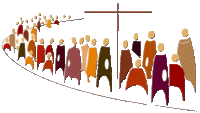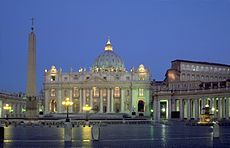- Community of the Chemin Neuf
-
Community of the Chemin Neuf 
Orientation Roman Catholic Polity Hierarchical Leader Laurent Fabre Distinct fellowships 1,400 Geographical areas 24 countries Official website www.chemin-neuf.org Part of a series on the Catholic Church 
Organisation Pope – Pope Benedict XVI College of Cardinals – Holy See Ecumenical Councils Episcopal polity · Latin Church Eastern Catholic Churches Background History · Christianity Catholicism · Apostolic Succession Four Marks of the Church Ten Commandments Crucifixion & Resurrection of Jesus Ascension · Assumption of Mary Theology Trinity (Father, Son, Holy Spirit) Theology · Apologetics Divine Grace · Sacraments Purgatory · Salvation Original sin · Saints · Dogma Virgin Mary · Mariology Immaculate Conception of Mary Liturgy and Worship Roman Catholic Liturgy Eucharist · Liturgy of the Hours Liturgical Year · Biblical Canon Rites Roman · Armenian · Alexandrian Byzantine · Antiochian · West Syrian · East Syrian Controversies Science · Evolution · Criticism Sex & gender · Homosexuality Catholicism topics Monasticism · Women · Ecumenism Prayer · Music · Art Catholicism portal
The Community of the Chemin Neuf is a Catholic ecumenical community. Created from a charismatic prayer group in 1973, it has currently 1,600 members in 24 countries and 12,000 persons work for the community. Its main founder was the Jesuit father Laurent Fabre.[1] The group was the subject of criticisms from former members and anti-cult associations.
Contents
Practices
The community was named after the first meeting in Lyon, Montée du Chemin Neuf. It was founded in the Charismatic Renewal and remains heavily marked by the Ignatian spirituality. The community focuses its action on the principle of unity: unity of Christians, unity of men, unity of couples and families. It regularly organizes some retreats for couples, families and / or engaged (Cana) for the divorcees (Cana Espérance), for the divorcees and remarried (Cana Samarie), an international evangelization (Net for God / Fraternité Œcuménique Internationale (FOI)), as well as an evangelization in the neighbourhood (evangelization in the street, Alpha course), sessions for young people, theological, philosophical and artistic trainings, and retreats following the Spiritual Exercises of Ignatius of Loyola.
Status
The community is composed of lay and religious persons from all Christian denominations: Catholic, Anglican, Reformed, Orthodox. In 1984, it was recognized by Cardinal Renard, and became a Public Association of Faithful by Cardinal Albert Decourtray, archbishop of Lyon. This canonical status allowed it to teach the Christian doctrine on behalf of the Catholic Church and to promote public worship. From a civi point of view, the community was recognized as religious congregation by a decree from the Prime Minister of France, on 23 July 1993.
In France, the community has several branchs located in Lyon, Anse (69), Soleymieu (38), Hautecombe (73), Plantay (01), Sablonceaux (17), Tigery (91), Chartres (28), Bouvines (59), Marseille (13), Levallois (92), Paris (75), Villeurbanne (69), Lucé-Mainvilliers (28), Lille (59), Reims (51), Sophia-Antipolis (06), Angers (49). The community is also present in Germany, Belgium, Brazil, Burkina Faso, Burundi, Canada, Congo, Côte d'Ivoire, Czech Republic, Egypt, United Kingdom, Hungary, Israel, Italy, Liban, Madagascar, Martinique, Maurice, Netherlands, Poland, Réunion, Swizerland, Chad.
Controversies
In the 1990s, former members of the community accused it of being a cult practicing brainwashing and proselytism.[2] French anti-cult association Centre contre les manipulations mentales also considered the community as a cult in its Dictionary of Cults.[3] Jérôme Dupré-Latour, a priest of the Diocese of Lyon, noted some cultic deviances, including strict obedience and authoritarian power.[4] Archbishop Jean Balland,[5] prist Jean Vernette,[6] and founder Laurent Fabre denied these accusations.[5]
References
- ^ (French) "La Communauté du Chemin Neuf". Conférence des évêques de France. http://www.eglise.catholique.fr/ressources-annuaires/guide-de-leglise/mouvements-et-associations/la-communaute-du-chemin-neuf.html. Retrieved 2009-08-14.
- ^ Thierry Baffoy, Antoine Delestre, Jean-Paul Sauzet, Les Naufragés de l'Esprit, Des sectes dans l'Église catholique, Le Seuil editions, 1996
- ^ Dico des sectes, Annick Drogou, Milan edition, 1998
- ^ (French) "Communauté du Chemin Neuf Association publique de fidèles — Appréciation des statuts reconnus par le diocèse de Lyon". Troumad. http://troumad.info/sectes/partie_5/JDupres.php. Retrieved 2009-08-14.
- ^ a b (French) "Les charismatiques sont-ils sectaires ?". Dernières Nouvelles d'Alsace. 1996-06-26. http://www.avipoc.org/presse/DNA-26-06-96-02.pdf. Retrieved 2009-08-14.
- ^ (French) Jean Vernette (2001-01-15). "L’Eglise catholique et les sectes". Conférence des évêques de France. http://www.cef.fr/catho/endit/sectes/sectes.rtf. Retrieved 2009-08-14.
- This article incorporates information from the revision as of 2009-08-14 of the equivalent article on the French Wikipedia.
External links
Categories:- Roman Catholic orders and societies
- Roman Catholic religious orders established in the 20th century
- Organizations established in 1973
- Catholic lay societies
Wikimedia Foundation. 2010.
